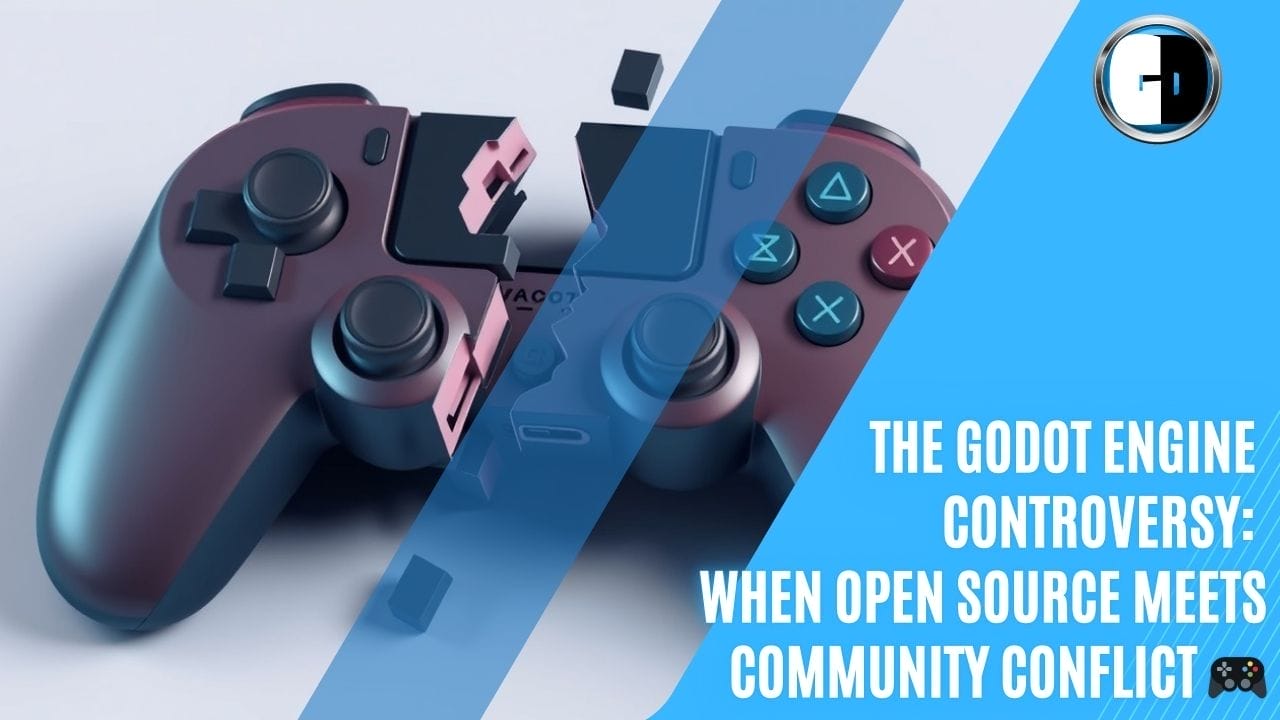First of all, this article is just about describing the facts of what is happening in the GODOT ecosystem. It is not about taking party toward a side or the other, just trying to list the facts of what has been happening with GODOT in the last days. In every dispute there is always two different realities that are not able to cool down and think if the other may be right too, and that talking and agreeing is the best way to move forward.
Navigating the Storm: How a Game Development Platform Grapples with Inclusivity and Technical Progress
In game dev circles, Godot Engine’s reputation for innovation and accessibility remains unquestionable. Yet 2024 brought unexpected turbulence. Community management choices ignited fierce debates, testing project’s resilience and core values. Let’s delve into this complex saga.
Article Key Takeaways:
- Godot Engine’s stricter moderation policies sparked widespread community backlash
- Mass banning campaign across platforms alienated contributors and supporters
- Financial and development impacts threaten project’s long-term viability
- Forking discussions emerge as community seeks alternatives
- Broader debates on open-source governance and inclusivity intensify
The Spark That Lit the Fire
Godot’s community manager, described by some as “obnoxiously queer,” implemented stricter moderation policies. Their goal? Create a more inclusive environment. However, many users felt these measures overstepped boundaries.

Banhammer Falls: A Community Divided
Moderation actions escalated rapidly across multiple platforms:
Twitter Turmoil
Users faced blocks for various reasons:
- Quoting Juan Linietsky (Godot’s creator)
- Inquiring about feature development
- Expressing concerns about project direction
GitHub Gridlock
Developers suddenly found themselves banned from contributing. Shockingly, this included folks who’d never interacted with Godot’s social media presence.
Discord Drama
Moderators aggressively targeted users questioning new policies or prioritization of social issues over technical development.

Community Reaction: A House Divided
Godot’s userbase split into two distinct camps:
- Moderation Supporters: These folks viewed actions as necessary for creating safe, inclusive spaces. They argued it cleansed toxic elements from community.
- Critics: Many saw it as overreach, stifling legitimate discussion and alienating valuable contributors. They feared focus shifting from game development to political activism.
Financial Fallout and Development Dilemmas
Controversy’s impact extended beyond heated debates:
- High-profile supporters, including a “titanium level backer,” had financial support blocked or withdrew voluntarily.
- Developers with accepted merge requests found themselves unable to contribute further.
- Concerns arose about potential slowdown in Godot’s development progress and community contributions.

Official Response: Too Little, Too Late?
Godot Foundation Board released statement:
- Taking responsibility for moderation actions
- Condemning harassment
- Offering review and rectification of mistaken bans
However, critics panned response as inadequate and potentially dishonest. Many argued it failed addressing core issues and seemed to deflect blame.
Fork in the Road: Community Explores Alternatives
Controversy sparked serious discussions about forking Godot Engine:
- “ReDot Engine” emerged as potential alternative, though details remain scarce.
- Other community factions contemplated creating own forks to preserve Godot’s original vision.

Ripple Effects: Industry Takes Notice
Godot’s troubles caught attention of wider game development community:
- Discussions erupted about role of politics in open-source projects.
- Developers and companies reconsidered Godot usage, weighing technical merits against potential community instability.
Deeper Debates: Beyond Godot
Controversy ignited broader conversations:
- Balancing Act: How can open-source projects create inclusive spaces while maintaining laser focus on technical development?
- Community Management Conundrum: What role should moderators play in tech communities? Where do we draw lines?
- Long-Term Sustainability: How do such controversies impact growth and viability of open-source projects?
Case Study: The Linux Kernel Controversy
Godot’s situation echoes past open-source conflicts. In 2018, Linux kernel maintainers adopted a Code of Conduct, sparking similar debates about inclusivity vs. meritocracy. While initially contentious, Linux community eventually adapted, demonstrating potential for resolution in such conflicts.
Looking Ahead: Uncertain Future for Godot
As October 2024 rolls on, Godot community grapples with these complex issues:
- Will forking efforts gain traction?
- Can trust be rebuilt between different factions?
- How will controversy impact Godot’s adoption in game development industry?
Only time will tell how this saga unfolds. One thing’s certain: Godot’s experience offers valuable lessons for open-source communities navigating choppy waters of inclusivity and technical progress.
Conclusion
Godot Engine’s 2024 controversy highlights challenges facing open-source projects today. Balancing inclusivity with technical focus ain’t easy. Community management decisions can have far-reaching consequences. As Godot charts its course forward, entire open-source world watches closely. Lessons learned here will shape future governance models and community-building efforts across tech landscape.
What’s your take on Godot’s situation? Have you experienced similar conflicts in other open-source communities? Share your thoughts in comments below! 👇
A game developer that wants to share its knowledge and experience with other game developers-





